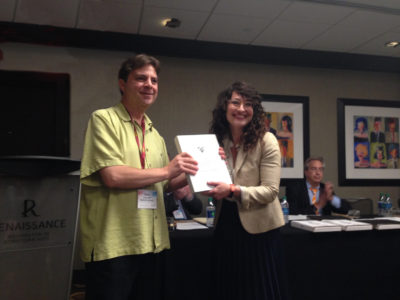Stanford Law Scholar Wins 2018 Stonecipher Award for Distinguished Research in Media Law and Policy
Stanford Law School’s (SLS) Center for Internet and Society Junior Affiliate Scholar and outgoing Lecturer in Law Morgan Weiland has been awarded the 2018 Harry W. Stonecipher Award for Distinguished Research in Media Law and Policy for her 2017 article, “Expanding the Periphery and Threatening the Core: The Ascendant Libertarian Speech Tradition.” The article, published in the Stanford Law Review in May 2017, uncovers a new theory undergirding the First Amendment’s expansion to include commercial and corporate speech.
The Stonecipher Award, granted by the Association for Education in Journalism and Mass Communication (AEJMC), recognizes the top scholarship published over the prior year on media law and policy.
“Weiland’s article merges analysis of the Supreme Court’s commercial and corporate speech doctrines and theory to provide a new lens for understanding recent decisions and legal developments,” the selection committee told Weiland in an email announcing the award. “As one judge said, ‘It is the best explanation that I’ve seen so far for a phenomenon we’ve all felt.’”
Weiland is the first graduate student to win the award. She proposed, helped design, and is in the process of completing the first joint degree JD/Ph.D. program between Stanford Law School, where she graduated in 2015, and Stanford’s Communication Department, where she is a Ph.D. candidate. Weiland will be clerking on the Ninth Circuit during the 2018-19 term.
The Expanding Boundaries of the First Amendment

The article argues that the Supreme Court effectively developed a new theory as it expanded the speech doctrine to include commercial and corporate speech, which Weiland calls the “libertarian tradition.” Though this approach initially sought to vindicate listeners’ interests in the free flow of information, where corporate benefit was incidental, over time listeners’ rights dropped out of the picture. Weiland argues that a naked corporate speech right was the result, and that right has been used as a deregulatory weapon—a phenomenon that Justices Breyer and Kagan noted in dissenting opinions last term in National Institute of Family and Life Advocates v. Becerra and Janus v. American Federation of State, County, and Municipal Employees.
“This paper gave me the opportunity to build on a growing body of legal scholarship interrogating the expanding boundaries of the First Amendment and the use of the speech right as a deregulatory weapon,” Weiland said. “By identifying and critiquing the libertarian tradition, I hope to explain why, as a theoretical and normative question, this doctrinal trend is both new and problematic.”
Weiland continued that these concerns are not merely academic, but impact citizens. “By applying the speech right so broadly and in increasingly incoherent instances, we risk diluting its deeper purpose of protecting individual, human speakers who have an interest in self-expression and autonomy, as well our collective interests in expression as vital to self-governance. Even more practically, when the speech right is used as a deregulatory weapon, it’s often vulnerable citizens who are harmed.” She added, “I’m thrilled to receive this honor and to have a platform to continue sharing my work.”
The award was established to honor the legacy of Harry W. Stonecipher, a First Amendment and Communication educator who mentored many notable scholars in his 15 years at Southern Illinois University, starting in 1969, according to AEJMC. The award comes with a $1,000 cash prize. Weiland accepted the award at the organization’s annual conference on August 7.
